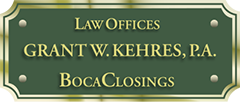Grant’s Commentaries
TRUSTS AND FLORIDA HOMESTEAD: NOT WHAT THEY APPEAR TO BE!
What can we learn from Aronson v. Aronson1?
Revocable living trusts are popular in Florida, suggested by many practitioners as the preferred way to a) avoid probate (it doesn’t always work…more on that in a future commentary), b) protect against creditors (also doesn’t work), and c) eliminate postmortem litigation between beneficiaries (didn’t work in this case!). When funded with Florida homestead real estate, the case of Aronson v. Aronson decided by Florida’s Third District Court of Appeals this month demonstrates that living trusts can have unintended consequences, disappointing all but the Florida attorney who get paid to litigate the issues.
In 1996, Hillard Aronson, a resident of Massachusetts, created a revocable living trust and deeded his Florida condominium to the trust. The plan of the trust was to provide the use of the trust assets for his wife for her life; and upon her death, the remainder to his children from a previous marriage. In addition, Mrs. Aronson had the right to require the trustees to annually distribute to her an additional 5% of the trust or $5,000, whichever was greater.2 Several years later, Mr. and Mrs. Aronson sold their Massachusetts home and permanently moved into the Florida condominium. A year later, Mr. Aronson passed away. At that time, the only asset in the trust was the condominium.
The successor trustees, who were Mr. Aronson’s sons from a prior marriage, formulated a plan to sell the condominium so they could annually distribute the 5 by 5 appointments demanded by their step mother.
The Court held a) the condominium was the homestead of Mr. Aronson as of the time of his death, b) the homestead may not be devised if the owner is survived by a spouse or minor child, and c) this restriction on homestead applies equally to property held in a revocable trust.
Because the condominium was Mr. Aronson’s homestead and he was survived by his wife, the condominium was not subject to disposition through the trust. At the moment of his death, Florida law reached into the trust, pulled the condominium out of the trust and passed it, outside of the trust to his wife for her life, with the remainder to his children, leaving the trust an empty shell and Mr. Aronson’s Massachusetts estate plan destroyed.
From this case we learn that a) Floridians with out-of-state estate plans should consult a Florida attorney to see if their estate plan documents achieve their objective under Florida law, b) Florida homestead property does not loose it’s character by placing it into a trust, and c) assets that are nominally in a trust are not necessarily in the trust! Title to property that was once a decedent’s homestead may be vested in someone other than the apparent public record owner, an implication suggesting that if your title company or title Florida attorney does not have a thorough understanding of Florida homestead and estate law, title to your home might not be as secure as your title insurance policy suggests.
*Grant Kehres is Board Certified by the Florida Bar Board of Legal Specialization as a Real Estate Law Specialist. He holds a doctorate in jurisprudence from Vanderbilt University, an MBA (finance) from Babson College and a dual undergraduate degree in investments and economics from Babson College. Admitted to The Florida Bar in 1978, he has handled nearly 10,000 closings for more than 6,000 clients. For more information on our services and what distinguishes our office from other law firms and title companies, call (561) 392-5200.
Posted 02-28-2012
1Aronson v. Aronson, — So.3d —, 2012 WL 280565 (Fla. 3d DCA February 1, 2012)
2Known as 5 by 5 powers, these rights are commonly found in certain estate planning documents.

